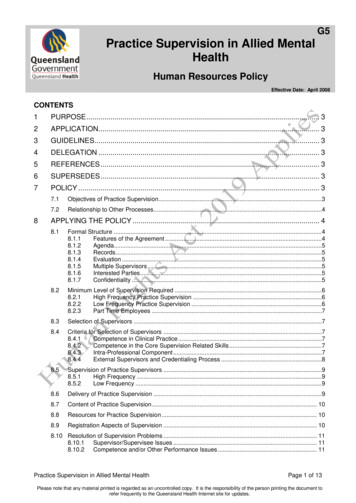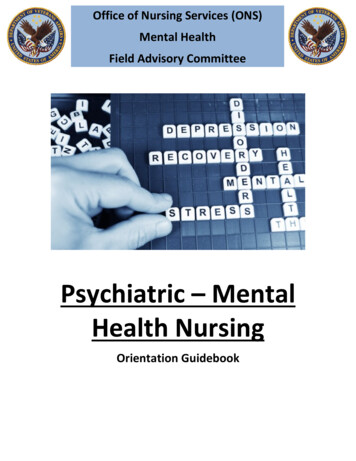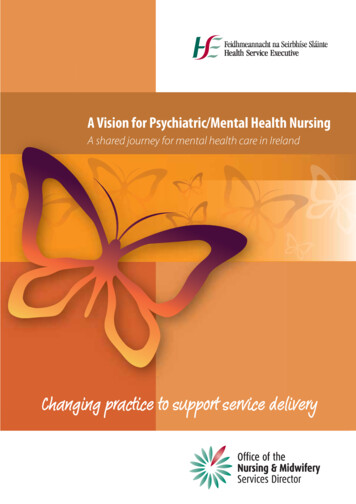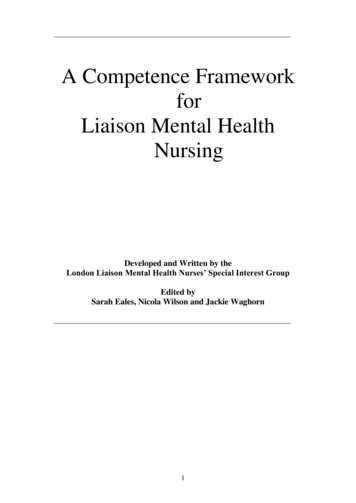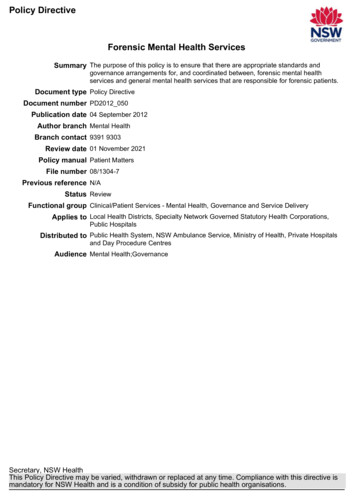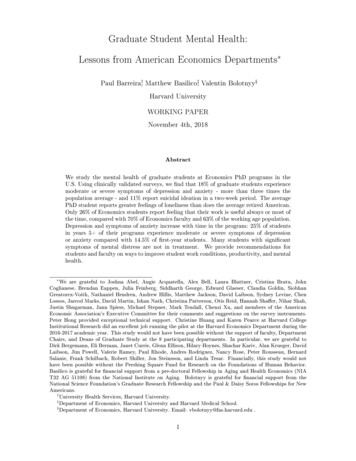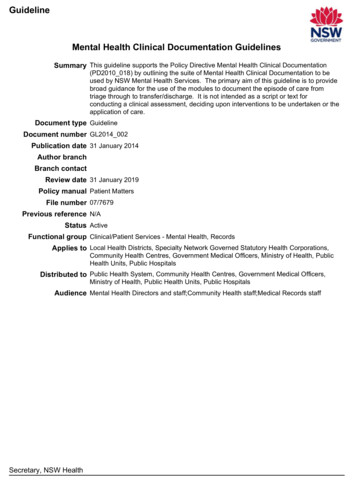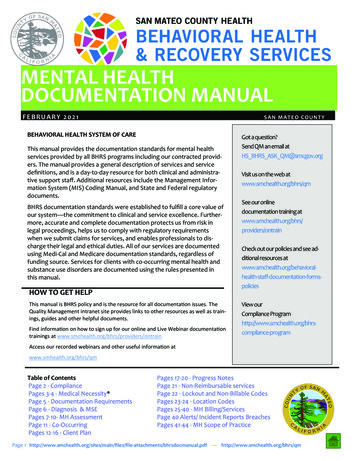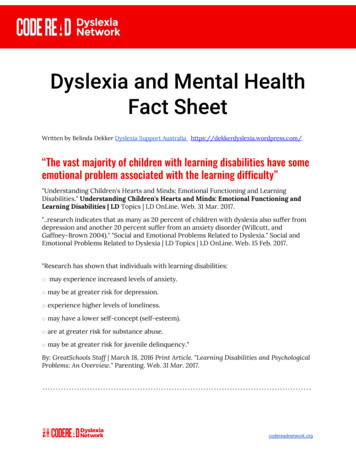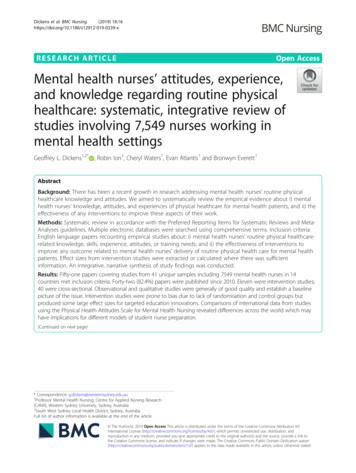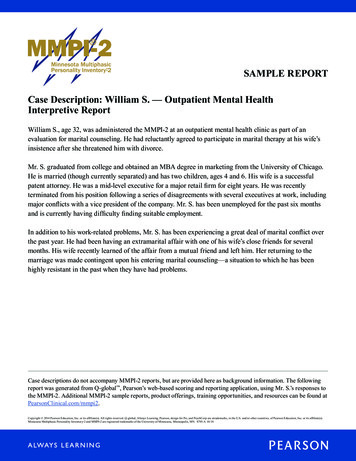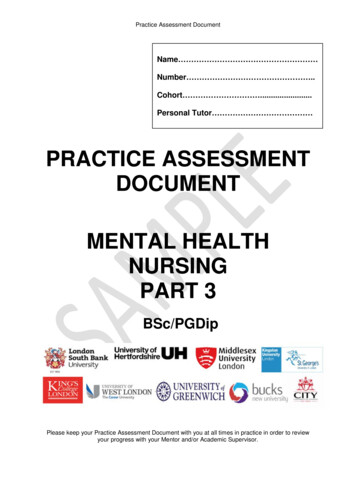
Transcription
Practice Assessment DocumentName Number .Cohort .Personal Tutor PRACTICE ASSESSMENTDOCUMENTMENTAL HEALTHNURSINGPART 3BSc/PGDipPlease keep your Practice Assessment Document with you at all times in practice in order to reviewyour progress with your Mentor and/or Academic Supervisor.
Practice Assessment DocumentContentsPageWelcome to your Practice Assessment Document (PAD)3Guidance for using the PAD4University Specific Guidelines5Descriptors for Assessing Students in Practice7List of Mentors/Supervisors8Placement 110Essential Skills Cluster38Part 3 Episode of Care57Part 3 Medicines Management60Action Plan62Sign-Off Mentor Record64Record of Practice Clinical Experience Hours66Extra Placement Information Forms742PLPAD (Version 4) Mental Health Part 3 (2017) SAMPLE
Practice Assessment DocumentWelcome to your Practice Assessment Document (PAD)Student responsibilitiesThis Practice Assessment Document is designed to support and guide you towards successfullyachieving the criteria set out in the Standards for Pre-Registration Nursing Education (NMC 2010).The PAD makes up a significant part of your overall programme assessment. It will need to beprocessed through formal University systems. Continuous assessment is an integral aspect ofassessment in practice and you are expected to show evidence of consistent achievement.Ensure you are familiar with your university assessment and submission processes for this documentand contact the academic representative from your university, or refer to the intranet if you requiresupport or advice on specific university procedures.The Ongoing Achievement Record (OAR) is a separate document that summarises yourachievements in each placement and with the main document provides a comprehensive record ofyour professional development and performance in practice.You are responsible for the safekeeping and maintenance of the PAD. It should be available to yourmentor/supervisor at all times when you are in placement together with the OAR. Alterations shouldbe made in this document by crossing through with one line, with a signature and date.You will have access to confidential information when in practice placements. The PAD should notcontain any patient/service user/carer identifiable information. Contents must not be disclosed to anyunauthorised person or removed, photocopied or used outside the placement or university.Mentor/Supervisor responsibilitiesAs a Mentor/Supervisor you have an important role in supporting and guiding the student throughtheir learning experience. This includes facilitating any reasonable adjustments the student may needto get maximum benefit from the placement.As well as undertaking the required assessments, your role also includes identifying relevant learningopportunities and creating learning and development plans with the student. Duty rotas shouldsupport the development of the student/mentor relationship and allow the facilitation of learning. Toenable this, 40% of the student’s time spent in practice must be under your direct or indirectsupervision.When assessing the student, take into account sources of evidence that encompass knowledge,skills, attitudes and the views of those receiving care. Comments should acknowledge thoseexceptional students who are exceeding expectations for their stage in practice or who haveparticularly commendable attitudes, behaviours, knowledge or skills.If the student is not meeting the required standards this should be highlighted as a development need.If there is a cause for concern or a fitness for practice issue that requires prompt action an Action Planshould be instigated to address specific needs or concerns with a specified timeframe. In the event ofthis, seek guidance from the university representative and/or senior practice representative.Sign-Off Mentor responsibilities (Part 3 only)Sign-off Mentors must allocate time with the student to reflect, give feedback and keep a record of thestudent’s progress in their final period of practice learning. In accordance with ‘Due Regard’, theassessor must be registered on the same part of the NMC register.3PLPAD (Version 4) Mental Health Part 3 (2017) SAMPLE
Practice Assessment DocumentGuidance for using the PAD to Facilitate and Guide Practice LearningAssessment criteria in the PAD are based on the NMC Essential skills clusters, progression criteriaand standards for competence (NMC 2010). All mentors/supervisors/other professionals whocomment in this document should sign and give their details on the record page which can be found inthe first section of this document.Components of Assessment (see individual university guidance/regulations)Professional Values: These are assessed and must be achieved by the end of each placement.Essential Skills: These can be assessed in a range of placements but need to be assessed asachieved at least once by the end of the Part.Assessment of an Episode of Care: This assesses the student’s progress towards competencyand must be achieved by the end of the Part. Examples are included in the ‘Student and mentorGuide’ An additional assessment of ‘medicines management’ is included in Part 2 and Part 3. Pleaserefer to the ‘student and mentor guide’ regarding specific guidance on drug calculations in Part 3.Patient/Service User/Carer Feedback Form: The mentor/supervisor must give permission beforethe person receiving care is approached for feedback on the student’s performance. This is notformally assessed but may contribute to the mentor/supervisor’s overall feedback.Recording Additional Experiences and Feedback: There are two additional forms (included ineach placement section, the first of these relates to working with other healthcare professionals/interprofessional working and the second can be completed by any staff member (inc. academicrepresentatives/link lecturer) who wish to record student progress.Process of practice assessmentPrior to placementStudent contacts the placement to obtain relevant informationand considers potential learning opportunities.Placement Orientation – see orientation checklistInitial InterviewMeeting to identify learning and development needs and learning opportunities.Mid-Point InterviewMeeting to discuss progress and identify learning and development needs.Final InterviewMeeting to review progress and identify learning and development needs. Mentorcompletes summary in OAR.Further information / guidance is included in the university specific pages (overleaf) and in theStudent and Mentor Guide to Practice Learning4PLPAD (Version 4) Mental Health Part 3 (2017) SAMPLE
Practice Assessment DocumentUniversity Specific Pages5PLPAD (Version 4) Mental Health Part 3 (2017) SAMPLE
Practice Assessment DocumentUniversity Specific Pages6PLPAD (Version 4) Mental Health Part 3 (2017) SAMPLE
Practice Assessment DocumentDescriptors for Assessing Students in PracticeThe NMC has identified skills and professional behaviours that a student must demonstrate by thefirst progression point:These criteria cover: Works independently, with minimal direct supervision, in a safe and confident manner. Demonstrates the ability to work as an autonomous practitioner by the point of registration.Mentors are required to assess students at the level they are expected to achieve for theirprogression point. These descriptors should be used when assessing Professional Values, EssentialSkills and the Episode of Care.By the end of Part 3 the student needs to achieve all the Essential Skills, ProfessionalValues, the Episode of Care Assessment and the Medicines ManagementAssessment.‘Achieved’ must be obtained in all three criteria by the studentAchievedYESNOKnowledge andunderstandingHas a goodknowledge-base andunderstanding isevident to support safeand effective practice.Can provideexplanations to others,justifying decisions &actions using a soundevidence-base.Is only able to identifythe essentialknowledge-base andneeds to developfurther understandingand/or has aninadequate knowledgebase or demonstratesunsafe practice.Professional attitudeIs able to demonstratepositive engagementwith learning and isable to respondproactively and flexiblyto situations.Is disengaged from thelearning process and/orrespondsinappropriately topatients/service usersand/or colleagues.Participation in careand practical skillIs able to safely,confidently andcompetently focus onthe patient in bothpredictable and lesswell recognisedsituations of care.With minimalsupervision is not ableto demonstrate safepractice and is unableto perform the activityindependently.7PLPAD (Version 4) Mental Health Part 3 (2017) SAMPLE
Practice Assessment DocumentList of Mentors/SupervisorsA sample signature must be obtained for all signatures within this document(All mentors must have attended an annual update in line with NMC requirements)NameJob TitleSignatureInitialsDate of lastMentor(please print)UpdatePlacement8PLPAD (Version 4) Mental Health Part 3 (2017) SAMPLE
Practice Assessment DocumentList of Mentors/SupervisorsA sample signature must be obtained for all signatures within this document(All mentors must have attended an annual update in line with NMC requirements)NameJob TitleSignatureInitialsDate of lastMentor(please print)UpdatePlacement9PLPAD (Version 4) Mental Health Part 3 (2017) SAMPLE
Practice Assessment DocumentNB: For some students a placement may be split across two areasPlacement 1Placement Provider:(e.g. Trust)Name of Practice Area:Type of Experience:(e.g. Community/Ward based)Practice Placement Telephone:Placement Contact Email:Start Date . End Date . . No. of Hours Mentor/Co-Mentor/Supervisor Details:Name:Designation:Name:Designation:Other Practice Staff/Key Contacts:Name:Designation:Academic Contact Details:(e.g. Link Lecturer)Name:Designation:Name:Designation:I have seen and discussed the purpose of the student’s Ongoing Achievement RecordMentor’s signature:Date:10PLPAD (Version 4) Mental Health Part 3 (2017) SAMPLE
Practice Assessment DocumentPlacement 1: OrientationName of Area 1Name of Area 2 (if app.)Name of Placement AreaInitial/DateInitial/Date(Student)(Mentor)The following criteria need to be met within the first day in A general orientation to the health and social careplacement setting has been undertakenThe local fire procedures have been explainedTel The student has been shown the: fire alarms fire exits fire extinguishersResuscitation policy and procedures have beenexplainedTel: .Resuscitation equipment has been shown andexplainedThe student knows how to summon help in the eventof an emergencyThe student is aware of where to find local policies health and safety incident reporting procedures infection control handling of messages and enquiries other policiesThe student has been made aware of informationgovernance requirementsThe shift times, meal times and reporting sick policieshave been explained.Policy regarding safeguarding has been explainedLone working policy has been explained (if applicable)Risk assessments/reasonable adjustments relating todisability/learning/pregnancy needs have beendiscussed (where disclosed)The following criteria need to be met prior to useThe student has been shown and given ademonstration of the moving and handling equipmentused in the clinical areaThe student has been shown and given ademonstration of the medical devices used in theclinical areaPlacement Provider induction/update complete, ifapplicable11PLPAD (Version 4) Mental Health Part 3 (2017) SAMPLE
Practice Assessment DocumentPlacement 1: Initial InterviewArea Name:This interview takes place within the first week of the placementStudent to identify learning and development needs (with guidance from the mentor)Mentor to identify learning opportunities to enable the student to meet their learning and developmentneeds and assessmentsMentor and student to negotiate and agree a learning plan -Student’s signature:Date:Mentor’s signature:Date:Additional Signature (If Applicable):Date:12PLPAD (Version 4) Mental Health Part 3 (2017) SAMPLE
Practice Assessment DocumentProfessional Values in PracticeStudents are required to demonstrate high standards of professional conduct at all times during theirplacements. Students should work within legal frameworks, and be able to articulate the underpinningvalues of The Code (2015). Professional values expectations are reflected in the statements below.Yes Achieved, No Not Achieved(Refer to Grade Descriptors on Page 7)Professional attitude, behaviour and responsibilityStudent Evidence edFinalYes/NoInitial/ Date(Final)1.The student maintainsconfidentiality inaccordance with the NMCcode and recogniseslimits to confidentiality forexample public interestand protection from harm.2. The student is nonjudgemental, respectfuland courteous at all timeswhen interacting withpatients/service usersand all colleagues.3. The student maintainsan appropriateprofessional attituderegarding punctuality andcommunicatesappropriately if unable toattend placement.4.The student’s personalpresentation and dresscode is in accordancewith the organisation’suniform policy.5. The student acts as arole model in promoting aprofessional image.6. The student isproactive in promotingand maintaining theperson’s privacy anddignity.7.The studentdemonstrates openness,trustworthiness andintegrity13PLPAD (Version 4) Mental Health Part 3 (2017) SAMPLE
Practice Assessment DocumentStudent Evidence edFinalYes/NoInitial/ Date(Final)8. The student makesconsistent effort to engagein and reflect on therequisite standards ofevidence based care andlearning to enhance careand their own professionaldevelopment.Safe and compassionate care9. The student is attentive,kind, compassionate an
Practice Assessment Document . PRACTICE ASSESSMENT DOCUMENT . MENTAL HEALTH . NURSING . PART 3 . BSc/PGDip . Please keep your Practice Assessment Document with you at all times in practice in order to review
